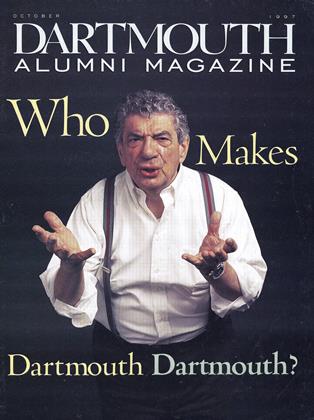Stewards, Chubbers, and Eminent Non-Conformists Divine
THE LATE ORT HICKS '21 (himself someone who made Dartmouth Dartmouth) used to say that nobody could understand the College unless he recognized it was a religion. The spiritual roots of the place go back even further than the beginning. Chemistry professor-historian Leon Richardson called Eleazar Wheelock's father, Ralph, an eminent non-conformist divine." Through Eleazar, straight through William Jewett Tucker 1861 and John Sloan Dickey '29 and John Kemeny '22 A to the people on the following pages, "non-conformists divine" have pushed and defined Dartmouth and helped fulfill its mission of liberal education. We are all the beneficiaries of Ralph Wheelock's progeny
By now, it's almost impossible to tease apart the strands of Dartmouth's history, mythology, and nostalgia. But search each strand to its source, and you'll find not an institution, but a person. This "voice, crying in the wilderness" sounds so clear and well because it's a choir, not a solo. It is different at Dartmouth because the intangibles here are those of the heart: a love of ritual and oral tradition, intimacy and access among students and faculty; extraordinary loyalties to class and institution; the stewardship of sacred places.
Dartmouth became known as a personal place where learning stretched beyond the classroom to the Out ing Club, the playing fields, the quiet of a dean's office. Where students knew their teachers and vice versa; where the norm was Corey Ford,who mentored writers (and boxers) from his home on North Balch Street; where math prof William Slesnick called every one of his hundred students by name. Never mind was— still is. It is where English professor Peter Bien gives advice to a former student, 20 years later.
In this issue, we pay tribute to those who make this place what it is. Many of them represent what the College has always been. You'll find extraordinary teachers, old-school coaches, and chubbers (that common breed of Dartmouth person who, in the words of the 1901 student handbook, "has a psychological blind spot for Dartmouth out of doors"). Others—Rich Brown, the non-conformist computer scientist, divine ethicist Ron Green—present not departures, but rather Dartmouth's continuing tradition of innovation. You won't find the obvious choices (who already appear from time to time in this magazine), such as James Freedman, the longest-tenured president in the Ivy League and person most responsible for Dartmouth's present direction, or admissions head Karl Furstenberg '67A, who picks and shapes each new class of the student body. And no amount of space could do justice to that student body—the hopeful, talented, and lucky young people who, ultimately, give Dartmouth its reason for being. Its living spirit.
What you will find are individuals who together represent something big in our mind s eye, who continue traditions, who create character, who have fixed Dartmouth's place on the world's map. People we could imagine being at Dartmouth and nowhere else. The searchers, stewards, mentors, and non-conformists who blur our distinctions between reality and mythology. Who make us realize that, in the end, more than location and history and nostalgia, it has always been people that make Dartmouth Dartmouth.
Dean Pelton stands by the classical notion that the beyond the classroom.
 View Full Issue
View Full Issue
More From This Issue
-
 Cover Story
Cover StoryPeter Bien
October 1997 By Robert Sullivan '75 -
 Cover Story
Cover StoryM. Lee Pelton
October 1997 By Jane Hodges '92 -
 Cover Story
Cover StoryMarysa Navarro-Aranguren
October 1997 By Holly Sorensen '86 -
 Cover Story
Cover StoryWilliam Cook
October 1997 By Heather McCutchen '87 -
 Cover Story
Cover StoryChris Miller '97
October 1997 By Jake Tapper ’91 -
 Cover Story
Cover StoryDartmouth Dogs
October 1997 By Robert Nutt '49








